标签:uil active reg main junit frame 联通 tomcat git仓库
Spring Cloud Config 是 Spring Cloud 团队创建的一个全新项目,用来为分布式系统中的基础设施和微服务应用提供集中化的外部配置支持,它分为服务端与客户端两个部分。其中服务端也称为分布式配置中心,它是一个独立的微服务应用,用来连接配置仓库并为客户端提供获取配置信息、加密 / 解密信息等访问接口;而客户端则是微服务架构中的各个微服务应用或基础设施,它们通过指定的配置中心来管理应用资源与业务相关的配置内容,并在启动的时候从配置中心获取和加载配置信息。Spring Cloud Config 实现了对服务端和客户端中环境变量和属性配置的抽象映射,所以它除了适用于 Spring 构建的应用程序之外,也可以在任何其他语言运行的应用程序中使用。由于 Spring Cloud Config 实现的配置中心默认采用 Git 来存储配置信息,所以使用 Spring Cloud Config 构建的配置服务器,天然就支持对微服务应用配置信息的版本管理,并且可以通过 Git 客户端工具来方便的管理和访问配置内容。当然它也提供了对其他存储方式的支持,比如:GIT仓库、SVN 仓库、本地化文件系统。
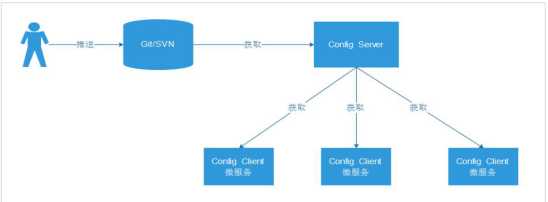
Config Server端主要和Git/SVN服务器
通俗点,就是统一管理配置,包括方便切换环境配置,以及修改配置无需动代码,省心省力;
如果用上SpringCloud Bus,能实现无需重启,自动感知配置变化以及应用新配置;
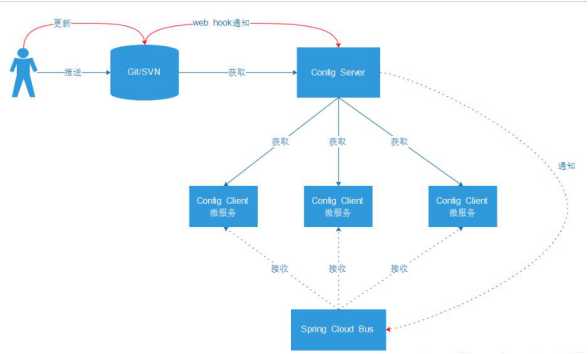
根据前面SpringCloud架构图,首先第一步,要搞个 configServer来联通远程GIT仓库,来读取远程配置;
这里GIT仓库,我们一般选用GitHub https://github.com/,或者码云 https://gitee.com/
我们这里用GitHub演示
建个仓库 microservice-config 然后 Git下载本地;
上传一个配置文件上到git仓库,application.yml 记住要utf-8编码,否则乱码,解析各种问题;
文件内容:
profile: hello
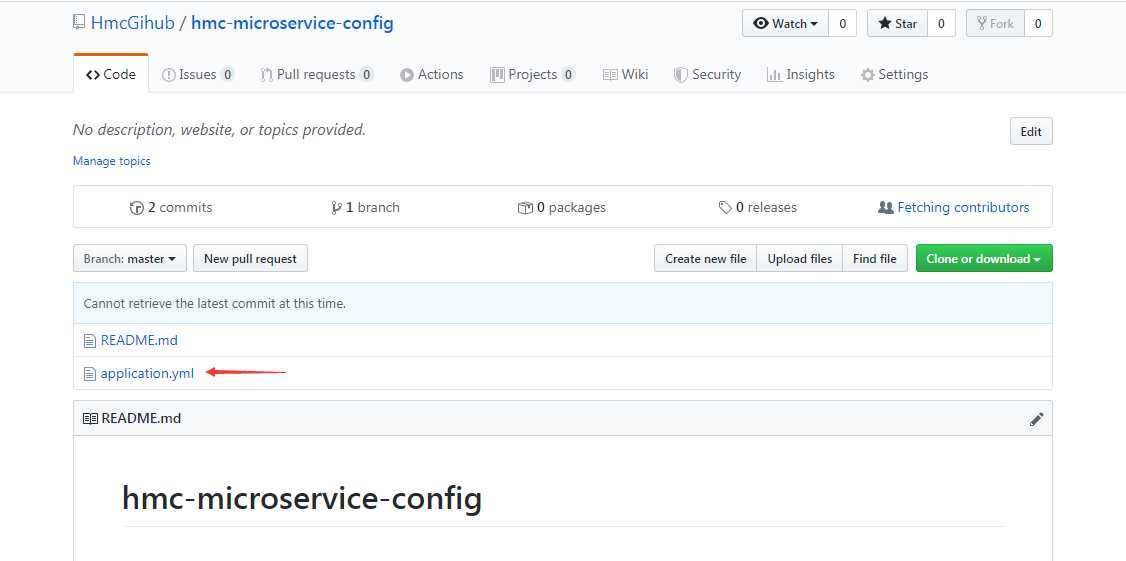
新建module:microservice-config-server-4001
<dependency> <groupId>org.springframework.cloud</groupId> <artifactId>spring-cloud-config-server</artifactId> </dependency>
完成pom文件
<?xml version="1.0" encoding="UTF-8"?> <project xmlns="http://maven.apache.org/POM/4.0.0" xmlns:xsi="http://www.w3.org/2001/XMLSchema-instance" xsi:schemaLocation="http://maven.apache.org/POM/4.0.0 https://maven.apache.org/xsd/maven-4.0.0.xsd"> <modelVersion>4.0.0</modelVersion> <parent> <groupId>com.hmc</groupId> <artifactId>springcloud</artifactId> <version>1.0-SNAPSHOT</version> </parent> <artifactId>microservice-config-server-4001</artifactId> <properties> <java.version>1.8</java.version> </properties> <dependencies> <dependency> <groupId>org.springframework.boot</groupId> <artifactId>spring-boot-starter</artifactId> </dependency> <dependency> <groupId>org.springframework.cloud</groupId> <artifactId>spring-cloud-config-server</artifactId> </dependency> <dependency> <groupId>org.springframework.boot</groupId> <artifactId>spring-boot-starter-test</artifactId> <scope>test</scope> <exclusions> <exclusion> <groupId>org.junit.vintage</groupId> <artifactId>junit-vintage-engine</artifactId> </exclusion> </exclusions> </dependency> </dependencies> <build> <plugins> <plugin> <groupId>org.springframework.boot</groupId> <artifactId>spring-boot-maven-plugin</artifactId> </plugin> </plugins> </build> </project>
启动类ConfigServerApplication_4001:
package com.hmc.microserviceconfigserver4001;
import org.springframework.boot.SpringApplication;
import org.springframework.boot.autoconfigure.SpringBootApplication;
import org.springframework.cloud.config.server.EnableConfigServer;
@SpringBootApplication
@EnableConfigServer
public class MicroserviceConfigServer4001Application {
public static void main(String[] args) {
SpringApplication.run(MicroserviceConfigServer4001Application.class, args);
}
}
这里要加下注解:@EnableConfigServer
github仓库的Http地址:
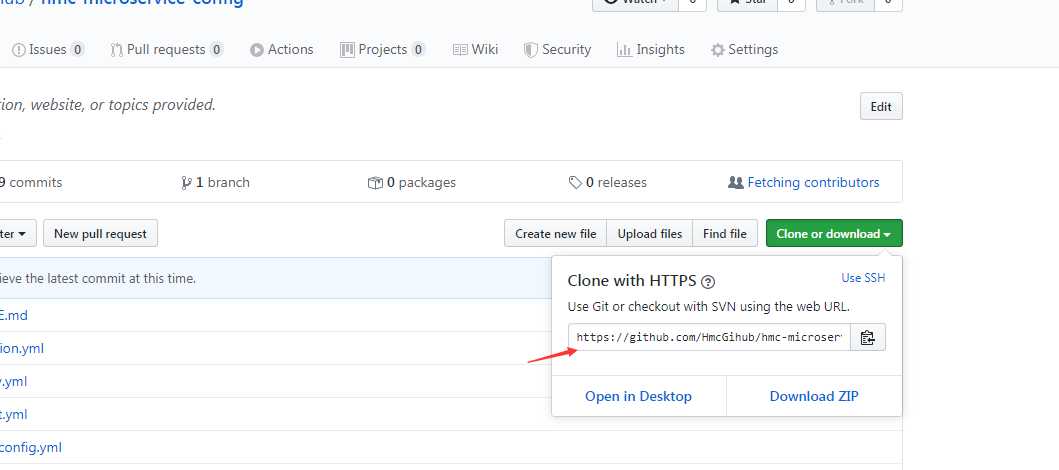
ym文件配置
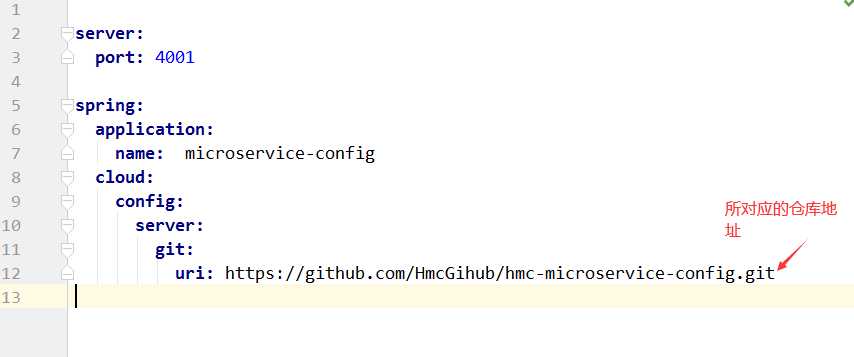
本地Hosts加个本地域名映射:
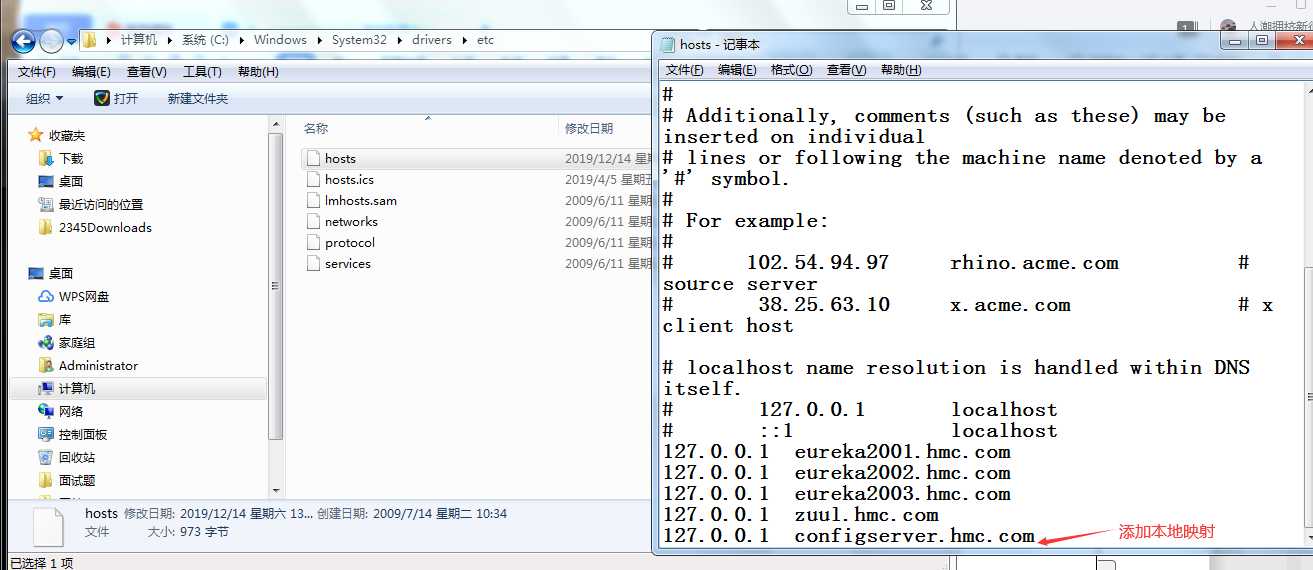
然后我们请求:http://configserver.hmc.com:4001/application-xxx.yml
返回结果了正确的文本结果;

至于请求路径,有匹配规则:
The HTTP service has resources in the form:
/{application}/{profile}[/{label}]
/{application}-{profile}.yml
/{label}/{application}-{profile}.yml
/{application}-{profile}.properties
/{label}/{application}-{profile}.properties
参考:
https://www.cnblogs.com/hellxz/p/9306507.html
根据前面的config原理图,我们需要建立Client端调用server端,最终实现client端获取远程git配置信息;
为了后面演示方便,我们提交三个配置文件到远程git库;
application.yml:
---
spring:
profiles:
active: dev
---
spring:
profiles: dev
port: 111
---
spring:
profiles: test
port: 222
crm-dev.yml
port:
777
crm-test.yml
port:
888
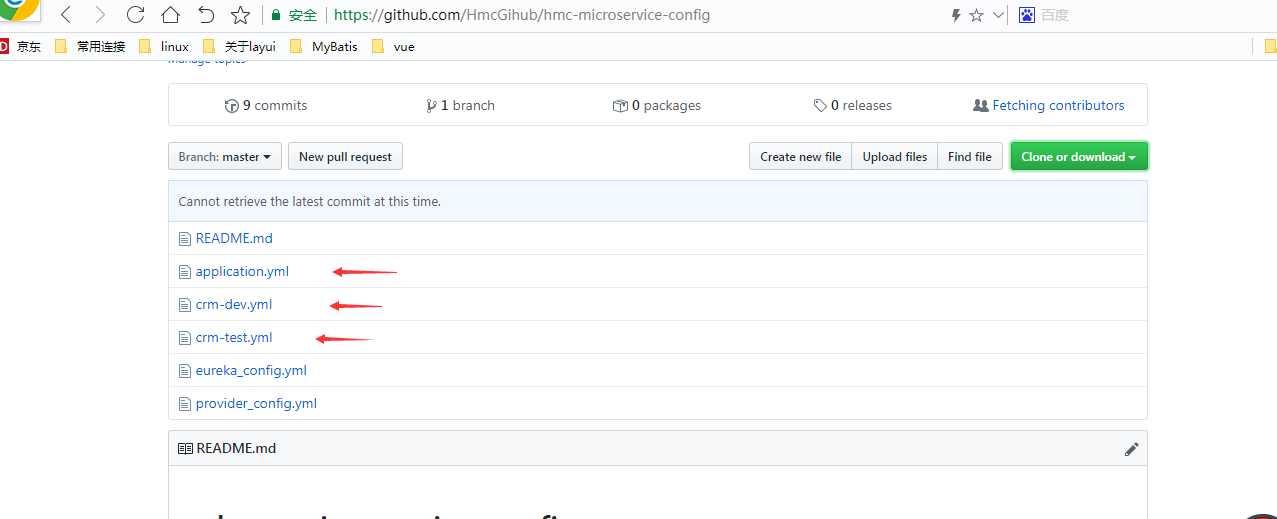
然后我们新建一个module microservice-config-client-5001
加下依赖:
<dependency> <groupId>org.springframework.cloud</groupId> <artifactId>spring-cloud-starter-config</artifactId> </dependency> <dependency> <groupId>org.springframework.boot</groupId> <artifactId>spring-boot-starter-tomcat</artifactId> </dependency> <dependency> <groupId>org.springframework.boot</groupId> <artifactId>spring-boot-starter-web</artifactId> </dependency>
我们项目启动的时候,就要调用server config端,获取配置信息,所以这里要bootstrap.yml配置文件,优先级最高:
spring:
application:
name: application-dev
cloud:
config:
name: crm
uri: http://configserver.javaxl.com:4001
profile: test
label: master
fail-fast: true
application.yml:
server:
port: 5001
context-path: /
ConfigClientController 类 测试显示端口
package com.hmc.microserviceconfigclient5001.controller;
import org.springframework.beans.factory.annotation.Value;
import org.springframework.web.bind.annotation.GetMapping;
import org.springframework.web.bind.annotation.RestController;
@RestController
public class ConfigClientController {
@Value("${port}")
private String port;
@Value("${server.port}")
private String serverPort;
@GetMapping("/getPort")
public String getPort() {
return "测试你访问的yml文件的端口是:【"+port+"】"+"[serverPort:]"+serverPort;
}
}
启动类:ConfigClientApplication_5001
package com.hmc.microserviceconfigclient5001;
import org.springframework.boot.SpringApplication;
import org.springframework.boot.autoconfigure.SpringBootApplication;
@SpringBootApplication
public class MicroserviceConfigClient5001Application {
public static void main(String[] args) {
SpringApplication.run(MicroserviceConfigClient5001Application.class, args);
}
}
最后 本地hosts我们加给配置:
127.0.0.1 client-config.hmc.com
我们启动项目:然后页面访问:
http://client-config.hmc.com:5001/getPort
即可获取远程端口配置信息;
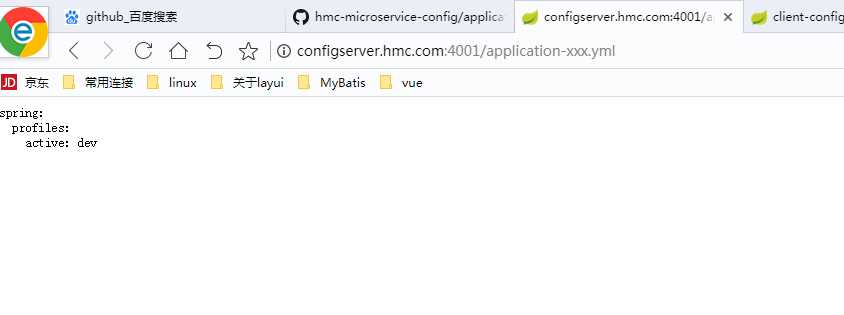
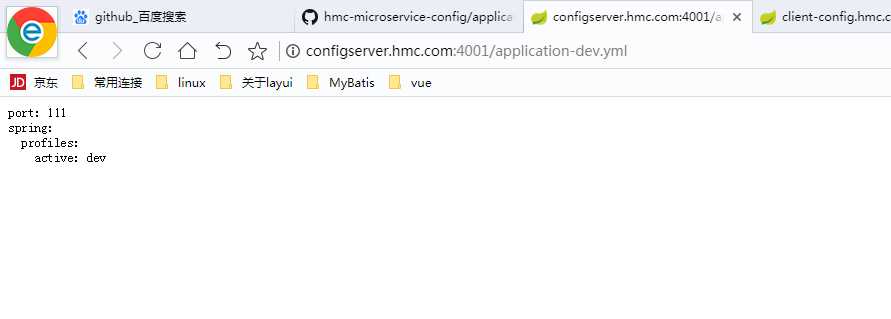
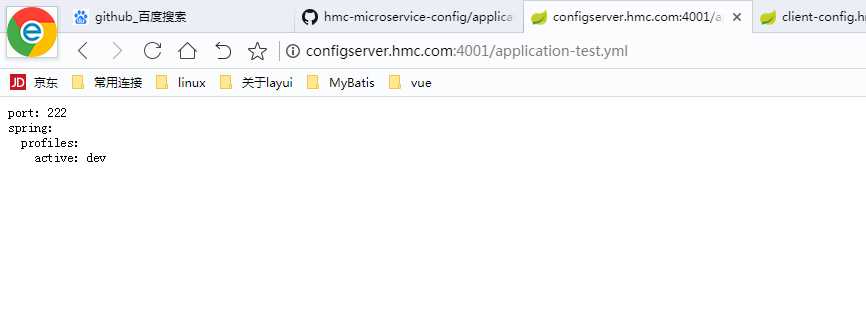

我们现在搞个实例来演示下,eureka整合config以及服务器提供者整合config,这样大伙可以举一反一,方便理解;
首先是eureka整合config
先弄一个配置文件到git;
eureka_config.yml
spring:
profiles:
active:
- dev
---
server:
port: 2004
context-path: /
spring:
profiles: dev
eureka:
instance:
hostname: localhost
client:
register-with-eureka: false
fetch-registry: false
service-url:
defaultZone: http://${eureka.instance.hostname}:${server.port}/eureka/
---
server:
port: 2005
context-path: /
spring:
profiles: test
eureka:
instance:
hostname: localhost
client:
register-with-eureka: false
fetch-registry: false
service-url:
defaultZone: http://${eureka.instance.hostname}:${server.port}/eureka/
标签:uil active reg main junit frame 联通 tomcat git仓库
原文地址:https://www.cnblogs.com/xmf3628/p/12040406.html